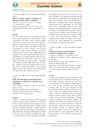TLDR Children's hair is more elastic, but tensile strength is similar across different factors.
The study investigated the tensile strength and elasticity of hair among 120 female volunteers divided into groups based on diet, oil application, age, and hair pigmentation. Results showed that children's hair had significantly higher elasticity compared to elderly hair (P = 0.05), but there was no significant difference in tensile strength. Nonvegetarians had higher tensile strength than vegetarians, but this was not statistically significant (P > 0.05). No significant differences were found in the other groups. The study concluded that while children's hair is more elastic, tensile strength does not significantly vary with age, diet, oil application, or pigmentation.
 61 citations
,
April 2012 in “British Journal of Dermatology”
61 citations
,
April 2012 in “British Journal of Dermatology” Caucasian women's hair appears thickest in their 20s, with perceived thinning after mid-30s due to both decreasing density and diameter.
 21 citations
,
July 2010 in “International Journal of Cosmetic Science”
21 citations
,
July 2010 in “International Journal of Cosmetic Science” Older people's hair becomes less shiny because it gets more uneven and curved.
 76 citations
,
December 2006 in “Journal of Dermatological Science”
76 citations
,
December 2006 in “Journal of Dermatological Science” Japanese women typically start experiencing hair loss after 40, with reduced hair density and thickness being the main factors.
27 citations
,
February 1991 Cuticle damage doesn't affect hair's tensile strength; the cortex is responsible for it.
 November 2020 in “INDIAN JOURNAL OF APPLIED RESEARCH”
November 2020 in “INDIAN JOURNAL OF APPLIED RESEARCH” Women with hair loss have weaker hair that breaks more easily.
 3 citations
,
January 2019 in “International Journal of Trichology”
3 citations
,
January 2019 in “International Journal of Trichology” The balance of thiol-disulfide in women with hair loss is affected but not damaged.
 5 citations
,
August 2018
5 citations
,
August 2018 Plant extracts can benefit skin but must be safe and high-quality.
48 citations
,
May 2021 in “Molecules” Plant extracts from dry flowers can be used as safe, effective dyes in cosmetics, offering skin protection and anti-aging benefits.
65 citations
,
March 2022 in “Molecules” Nanocarriers can enhance cosmetics but face regulatory and safety challenges.





